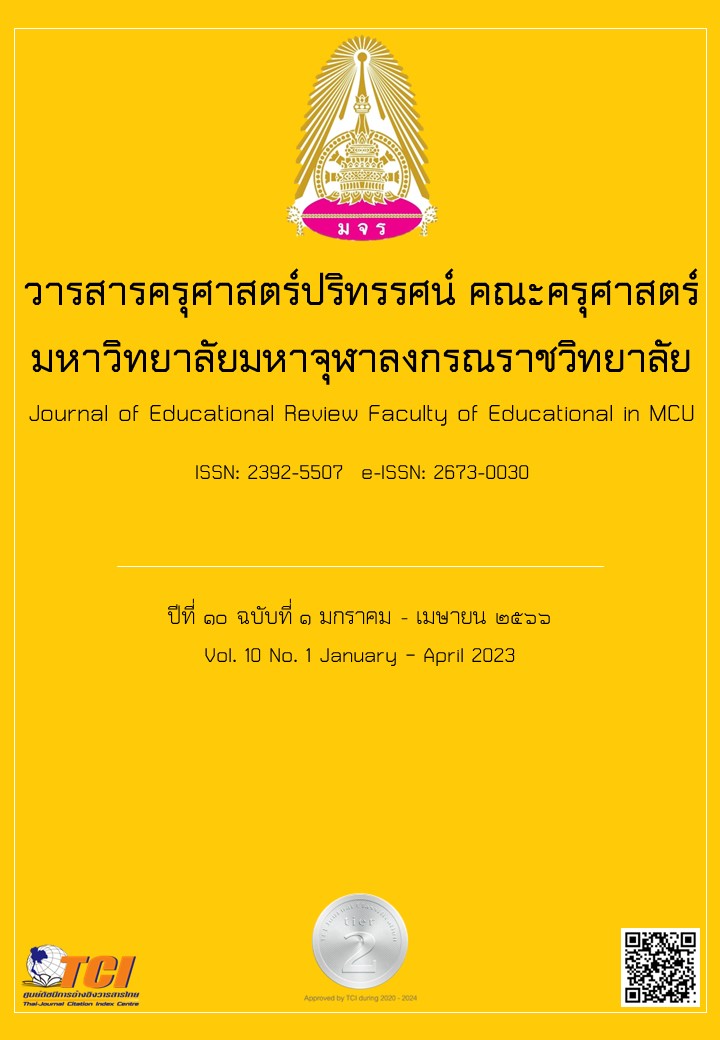A NEEDS ASSESSMENT OF TEACHER COACHING SKILLS DEVELOPMENT IN KHUN DAN PRAKANCHON SCHOOL CONSORTIUM UNDER THE SECONDARY EDUCATIONAL SERVICE AREA OFFICE PRACHINBURI NAKHON NAYOK
Main Article Content
Abstract
The objectives of this research were 1) to study the current and desirable conditions of teacher coaching skills development in Khun Dan Prakanchon school consortium under the secondary educational service area office Prachinburi Nakhon Nayok. 2) to study assess the needs for teacher coaching skills development in Khun Dan Prakanchon school consortium under the secondary educational service area office Prachinburi Nakhon Nayok. This is descriptive research. The research instruments used in this study were questionnaires. Data were collected from 150 samples of administrators and teachers in Khun Dan Prakanchon school consortium under the secondary education service area office Prachinburi Nakhon Nayok, Academic Year 2021. The data were analyzed by mean, standard deviation, priority need index (PNImodified), and priority order. The results of the research were as follows: 1) The desirable condition averaged higher than the present condition of teacher coaching skills development in Khun Dan Prakanchon school consortium under the secondary educational service area office Prachinburi Nakhon Nayok. The current condition was at a moderate level (M= 3.163, S.D. = 0.661), while the desirable condition was at the highest level (M = 4.513, S.D. = 0.599). 2) The highest order of need for teacher coaching skills development in Khun Dan Prakanchon school consortium under the secondary educational service area office Prachinburi Nakhon Nayok was Questioning skill (PNImodified = 0.469), followed by feedback skill (PNImodified = 0.443), deep listening skill (PNImodified = 0.404), and lowest was in Rapport building skill (PNImodified = 0.398), respectively.
Article Details

This work is licensed under a Creative Commons Attribution-NonCommercial-NoDerivatives 4.0 International License.
ทัศนะและความคิดเห็นที่ปรากฏในบทความในวารสารฉบับนี้ถือเป็นความรับผิดชอบของผู้เขียนบทความนั้นเพียงผู้เดียว และไม่ถือเป็นทัศนะและความรับผิดชอบของกองบรรณาธิการ
กองบรรณาธิการขอสงวนสิทธิ์ในการคัดเลือกบทความลงตีพิมพ์และจะแจ้งให้เจ้าของบทความทราบหลังจากผู้ประเมินบทความตรวจอ่านบทความแล้ว
ต้นฉบับที่ได้รับการตีพิมพ์ในวารสารครุศาสตร์ปริทรรศน์ คณะครุศาสตร์ มหาวิทยาลัยมหาจุฬาลงกรณราชวิทยาลัย ถือเป็นกรรมสิทธิ์ของคณะครุศาสตร์ มหาวิทยาลัยมหาจุฬาลงกรณราชวิทยาลัย ห้ามนำข้อความทั้งหมดหรือบางส่วนไปพิมพ์ซ้ำ เว้นเสียแต่ว่าจะได้รับอนุญาตจากมหาวิทยาลัยฯ เป็นลายลักษณ์อักษร
References
ทัศนีย์ จารุสมบัติ. (2561). ชีวิตที่ใช่! ในแบบโค้ชและฟา. กรุงเทพมหานคร : สำนักพิมพ์จุฬาลงกรณ์มหาวิทยาลัย
ธารทิพย์ นรังศิยา, วรรณี แกมเกตุ. (2559). การวิเคราะห์โมเดลเชิงสาเหตุของความสำเร็จของการชี้แนะและการเป็นพี่เลี้ยงครู. An Online Journal of Education. 11(2). 235-250.
มยุรี เจริญศิริ. (2558). การศึกษารูปแบบการพัฒนาสมรรถนะการโค้ชและการจัดการเรียนรู้ของครูที่ส่งเสริมให้ผู้เรียนเกิดทักษะการคิดแก้ปัญหา. วารสารศึกษาศาสตร์ มหาวิทยาลัยศิลปากร. 13(1). 114-127.
วรรัตน์ ปทุมเจริญวัฒนา. (2561). การชี้แนะและการเป็นพี่เลี้ยง (Coaching and Mentoring). แหล่งที่มา https://www.trueplookpanya.com/blog/content/66324/-blog-teaartedu-teaart-teaarttea- สืบค้นเมื่อ 9 ต.ค. 2564.
ศศิมา สุขสว่าง. (2564). ทักษะการโค้ช (Coaching Skill) สำหรับผู้บริหารเพื่อพัฒนาศักยภาพผู้ใต้บังคับบัญชา. แหล่งที่มา www.sasimasuk.com สืบค้นเมื่อ 12 ต.ค. 2564.
สถาบันส่งเสริมการสอนวิทยาศาสตร์และเทคโนโลยี. (2563). การให้ความช่วยเหลือและสนับสนุนของครูส่งผลต่อผลการประเมินด้านการอ่านของนักเรียนอย่างไร. กรุงเทพมหานคร: สถาบันส่งเสริมการสอนวิทยาศาสตร์และเทคโนโลยี.
สมาพร มณีอ่อน. (2560). การพัฒนาครูในศตวรรษที่ 21 โดยใช้เทคนิคการโค้ช (Coaching). วารสารศึกษา ศาสตร์ มหาวิทยาลัย ศิลปากร. 15(2). 61-73.
สำนักงานข้าราชการครูและบุคลากรทางการศึกษา. (2560). หลักเกณฑ์และวิธีการพัฒนาข้าราชการครูและบุคลากรทางการศึกษา สายงานการสอน (ว22/2560). แหล่งที่มา https://otepc.go.th สืบค้นเมื่อ 26 ธ.ค. 2564.
สำนักงานคณะกรรมการพัฒนาการเศรษฐกิจและสังคมแห่งชาติ. (2561). ยุทธศาสตร์ชาติ พ.ศ. 2561 – 2580 (ฉบับย่อ). แหล่งที่มา http://nscr.nesdb.go.th สืบค้นเมื่อ 26 ธ.ค. 2564.
สำนักงานรับรองมาตรฐานและประเมินคุณภาพการศึกษา องค์การมหาชน. (2563). ผลการประเมินคุณภาพภายนอกรอบ 4. แหล่งที่มา https://drive.google.com/file/d/1D5eUQ4kYNwuZU6TPFYqhaAmwBwS05-Ul/view สืบค้นเมื่อ 26 ธ.ค. 2564.
สำนักงานเลขาธิการสภาการศึกษา. (2562). สภาวะการศึกษาไทย 2561/2562 การปฏิรูปการศึกษาในยุคดิจิทัล. กรุงเทพมหานคร: สำนักงานเลขาธิการสภาการศึกษา.
สุวิมล ว่องวาณิช. (2558). การวิจัยประเมินความต้องการจำเป็น. กรุงเทพมหานคร: สำนักพิมพ์แห่งจุฬาลงกรณ์มหาวิทยาลัย.
Gottesman, B. (2000). Peer coaching for educators. Lamha: The Scarecrow.
Krejcie, R. V. & Morgan, D. W. (1970). Determining Sample Size for Research Activities. Educational and Psychological Measurement. 30(3). 607-610.
Neufeld and Roper. (2010). Barbara Neufeld and Dana Roper. Coaching: A Strategy for Developing Instructional Capacity Promises and Practicalities Education Matters, Inc.
Rao, M. S. (2015). Myths and truths about coaching: How to acquire right perspective to enhance leadership excellence. Human Resource Management International Digest. 23(4). 35-37.
Williamson, R. (2012). Coaching teachers: An important principal role. From http://eric.ed.gov/?id=ED538322 Retrieved December 26, 2021.


